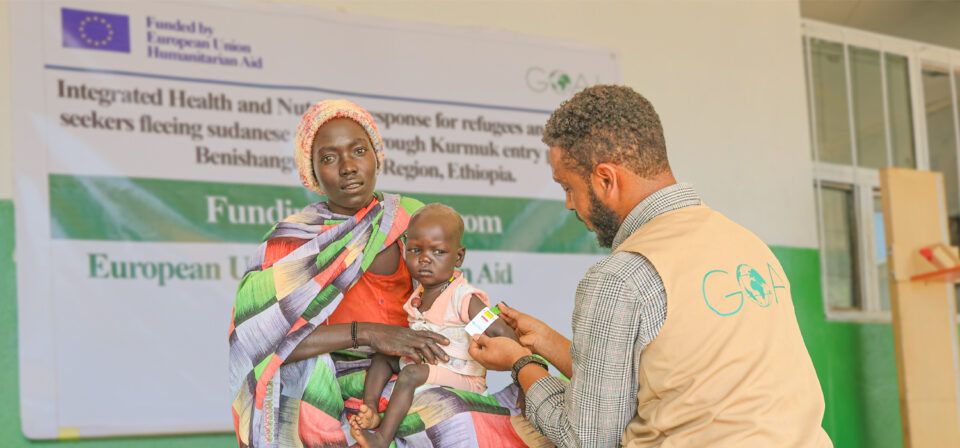 Stories
Stories
July 23, 2025 • 3 min read
At the Kumruk refugee transit center near the Ethiopia–Sudan border, new arrivals are getting nutrition and medical support, including 22-year-old Enam Ismael and her malnourished child, who received critical care from GOAL’s health team. GOAL, supported by the European Union Humanitarian Aid, delivers health and nutrition services to both refugees and local communities. The inclusive approach is bridging humanitarian gaps and offering renewed hope for displaced families and their generous hosts.

The ongoing conflict in Sudan has unleashed a profound humanitarian crisis, displacing millions internally and driving countless others to seek refuge in neighbouring countries. Over 20 million people are grappling with critical food insecurity as basic services collapse under the strain of war. Refugees face perilous journeys to escape violence, often with little to no access to food, water, or medical care.
Ethiopia has emerged as a vital sanctuary for those fleeing the conflict, particularly through entry points in the Gondar and Benishangul-Gumuz regions. Refugees arrive in dire conditions, exhausted, malnourished, and in desperate need of assistance. In response, GOAL, supported by the European Union, is stepping in to provide life-saving support, including health and nutrition services.
Enam Ismael’s Journey
Enam Ismael, a 22-year-old mother of two, once enjoyed a stable life in Sudan. However, the war shattered her reality. Like many, she clung to the hope that the conflict would end quickly, but after more than two years, she was left with no choice but to flee.
Enam is originally from Damazīn, the capital of Blue Nile State, Sudan. Before the war, the journey to the Ethio-Sudan border was a mere four-hour drive. But amid the chaos and destruction, it took her two harrowing days to reach the Kumruk refugee transit centre in Ethiopia’s Benishangul-Gumuz region.
After arriving and completing her formal registration, Enam visited GOAL’s health facility in the Kumruk transit area. The health team conducted a check-up for her and her two-year-old son, Usman Ali. While Enam was found to be in stable condition, Usman was diagnosed with moderate malnutrition. He was immediately provided with supplementary food to aid his recovery and treatments to prevent further complications.
An Inclusive Approach for Host Communities
In many parts of Africa, tensions often arise between host communities and refugees. Host communities, who frequently share their limited resources with refugees, can feel neglected as humanitarian aid disproportionately focuses on the displaced. Despite their generosity, they often lack access to basic services, exacerbating feelings of inequity.
GOAL has adopted an inclusive approach, ensuring that both refugees and local communities benefit from the support provided. The health facility in the Kumruk transit centre, for instance, serves not only refugees but also the surrounding local population.
“There was no quality healthcare service around here before,” explained Chaltu Asfaw, a resident. “We had to rely on home remedies or travel over two and a half hours to access a proper health facility. However, thanks to GOAL and its supporters, we can now access healthcare right here. This is a tremendous relief, especially for mothers and children. We are deeply grateful for this support,” Chaltu added.
A Call for Continued Support
Mohamed Ali, a GOALie and dedicated health worker at the Kumruk transit centre, has witnessed firsthand the suffering and resilience of refugees. Alongside his team, he works tirelessly to provide relief to those arriving in distress.
“It’s both heartbreaking and rewarding,” Mohamed shared. “I feel disheartened every time I see malnourished children, but witnessing their recovery fills me with hope and energy. Our work would not be possible without the support of the European Union, and for that, I am profoundly thankful.”
He added an emotional reminder: “I hope the world will not forget the war in Sudan. Continued support is critical for refugees here in Ethiopia and in neighbouring countries.”

